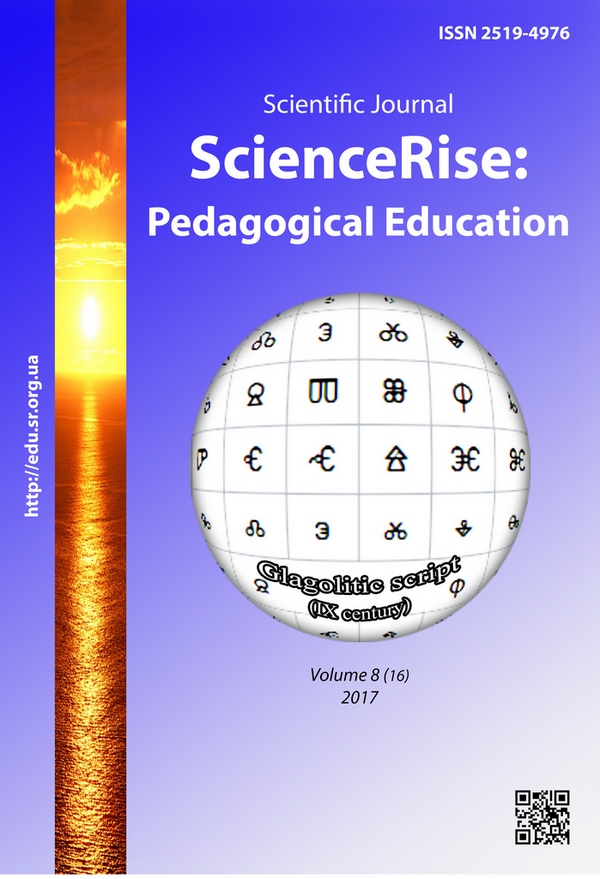Formation of competency of health protection at the sanitary and hygienic culture mastering by students of agroecological collges
DOI:
https://doi.org/10.15587/2519-4984.2017.109091Keywords:
youth, sanitary-hygienic culture, healthy lifestyle, special course, agroecological college, health, studentsAbstract
The attitude to health as to the value forms especially actively at the adolescent and young age and is a result of the influence of education and surrounding social environment. Especially, the importance of the problem of formation of the value attitude to health in students of an agroecological college is conditioned by their age features and mastering of the future profession.
Pupils’ entrance to a college is a crucial moment of their socialization. This moment coincides in time with their age crisis of development, it brings serious test of their adaptive possibilities. A new collective, new regime, new character of interrelations needs from students new forms of the study and behavior. Adapting to new conditions, an organism mobilizes the system of adaptive reactions for this aim.
During the study in an agroecological college a student must form such professional dynamic stereotype and lifestyle that favors keeping and strengthening of his/her health and others’ one.
The results of the research determined the problems that need further elaboration:
– the role of a collective of an educational institution in the sanitary-hygienic upbringing of students;
– the activity and interaction of social institutions as to the formation of the competence of bases of health protection of the sanitary-hygienic culture of future specialists of the agroecological branch;
– the substantiation of the professionally directed special course as to health protection in the system of training of future specialists of the agroecological branch
References
- Balakirev, A., Cooper, T., Artyukh, A. R. et. al.; Balakirev, A. (Ed.) (2011). State of health factors and Ukrainian teenagers. Kyiv: UNICEF Eng. Inst social. for Scientific. them. Yaremenko, "KIS", 172.
- Materials Resource Center State Institute of Family and molodi. Available at: http://www.mzz.com.ua
- Materials Research "demographic aspects of youth policy". Institute of Demography and Social Studies M. V. Ptukha. Available at: http: //www.idss.org.ua
- Kupchynov, R. I. (2004). Formation of a healthy lifestyle studencheskoy young people. Minsk: UE "YVTS Mynfyna", 211.
- Yezhova, O. O. Efficiency educational system forming value attitude to health in students of vocational schools. Health Pedagogy. Kharkiv: HNPU them. Skovoroda, 2012.
- Lisitsyn, Y. P. (2002). Public health and health. Moscow: HEOTAR-MED, 517.
- Suschenko, L. P. (2000). On the theoretical basis of professional training of specialists in physical education and sport. Pedagogics and psychology of vocational education, 3, 61–70.
- Skyriak-Nizhnik, Z. A. (1996). Current demographic situation in Ukraine Pediatrics, obstetrics and gynecology, 4, 4–5.
- Petlenko, V. P. (Ed.) (1998). Fundamentals of valeology. Book 1 Kyiv: Olympic literature, 445.
- Libanova, E. M. (Ed.) (2010). Youth and youth policy in Ukraine: socio-demographic aspects. Kyiv: Institute of Demography and Social Studies. M.V. Ptukha NAS of Ukraine, 248.
Downloads
Published
How to Cite
Issue
Section
License
Copyright (c) 2017 Alina Suk

This work is licensed under a Creative Commons Attribution 4.0 International License.
Our journal abides by the Creative Commons CC BY copyright rights and permissions for open access journals.
Authors, who are published in this journal, agree to the following conditions:
1. The authors reserve the right to authorship of the work and pass the first publication right of this work to the journal under the terms of a Creative Commons CC BY, which allows others to freely distribute the published research with the obligatory reference to the authors of the original work and the first publication of the work in this journal.
2. The authors have the right to conclude separate supplement agreements that relate to non-exclusive work distribution in the form in which it has been published by the journal (for example, to upload the work to the online storage of the journal or publish it as part of a monograph), provided that the reference to the first publication of the work in this journal is included.








